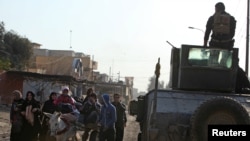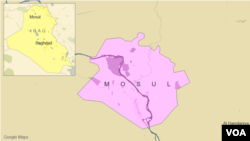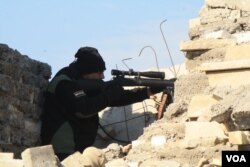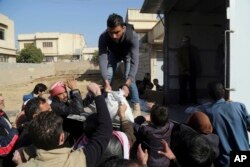Humanitarian agencies have expressed fear for the safety of 750,000 Iraqi civilians living in western Mosul as government forces are expected to mount an all-out offensive in the coming weeks to retake the city from Islamic State militants.
The Iraqi government reportedly has regained full control of eastern Mosul, 100 days after military operations to oust IS fighters from the city began. The government has now set its sights on recapturing the western part of Mosul, and this has been causing concern among humanitarian workers.
The United Nations reports nearly half of all casualties from Mosul are civilians. It has warned that people caught up in fighting in western Mosul face multiple risks, including being killed in crossfire, by booby traps or while being used as human shields.
Troubling reports
"The reports from inside western Mosul are distressing," said Lise Grande, humanitarian coordinator for Iraq. "Humanitarian partners are unable to access these areas, but all the evidence points to a sharply deteriorating situation."
The International Organization for Migration has a staff of 1,000 people in Irbil, in northern Iraq. Many of these people have family members and friends in Mosul.
IOM spokesman Joel Millman said his agency had been receiving reliable information from these sources regarding the fearful and difficult conditions under which people in western Mosul are living.
"We understand that water stations have been hit and destroyed, so there is a terrible shortage of water," he said. "People are digging wells in backyards, trying to treat the water the best they can."
Millman said there was not enough food in the city, driving up black market prices for ordinary commodities such as sugar, flour and chickpeas.
"We also understand that people are burning furniture for heat and for cooking fires because there is no delivery of any kind of propane or other gas," he said.
Grande said it wasn't possible to predict how the battle for western Mosul would turn out, but she did not rule out "the possibility of siege-like conditions or a mass exodus."
Meanwhile, the office of the U.N. High Commissioner for Human Rights reported civilians in eastern Mosul were continuing to be victims of attacks by IS militants, although this part of the city has been retaken by Iraqi forces.
Civilian deaths
Ravina Shamdasani, the high commissioner's spokeswoman, said her agency had received many reports of civilians being killed by IS shelling or improvised explosive devices.
"Civilians have been killed and wounded by ISIL suicide attacks and snipers, which appear to be directly targeting civilians and civilian homes, as well as IEDs left by ISIL prior to their retreat from these areas — including one last Tuesday, which caused a child to lose his arm," she said, using another acronym for Islamic State.
Shamdasani said IS also continued to attack those fleeing or attempting to flee areas it controlled. She said airstrikes in Mosul reportedly were continuing to cause civilian casualties.
She said it was difficult to verify how many civilians have been killed or wounded because IS reportedly "continues to base itself in civilian houses and infrastructure and is exploiting civilians as shields."
Shamdasani said the high commissioner was very worried by reports that IS fighters had taken over hospitals in western Mosul and were using them as military bases, "and that they are diverting available resources, including food, water and medicines, to their fighters."
Relief efforts increase
The United Nations and its partners have been running a big relief operation for Iraqi civilians fleeing the fighting in Mosul. The United Nations had warned that as many as 1 million civilians might become displaced. So far, this "worst case" scenario has not materialized.
IOM's Millman said 180,000 people had fled eastern Mosul, while more than 550,000 civilians had remained in their homes.
"Humanitarian partners have been working as quickly as possible to provide direct lifesaving assistance. Nearly 600,000 people have received food, 745,000 people have benefited from water and sanitation support, and 370,000 people have sought medical care," he said.
He noted 85 percent of the people displaced from Mosul were staying in 13 camps, 10 of them full.
"The world's attention is fixed on the military campaign in Iraq," said humanitarian coordinator Grande. "But once this is over, there will still be a humanitarian crisis."
She warned that as many as 3 million to 4 million Iraqis might be displaced by the conflict and in need of humanitarian assistance for some time to come.
"We hope and trust that the international community will not walk away after Mosul. It would be a mistake, a very big one, if this were to happen," Grande said.







